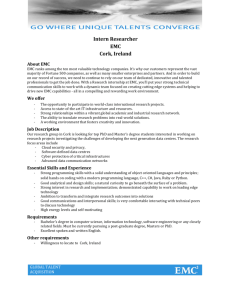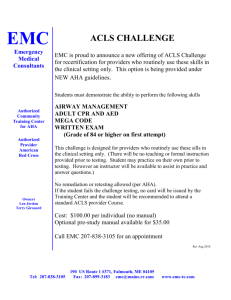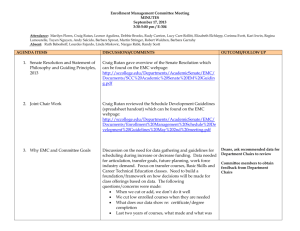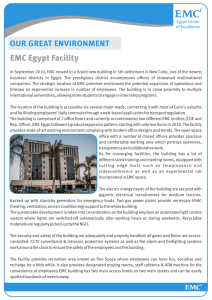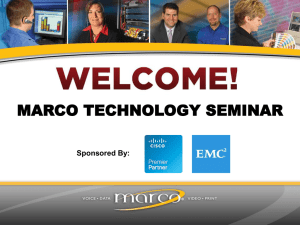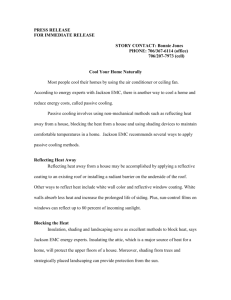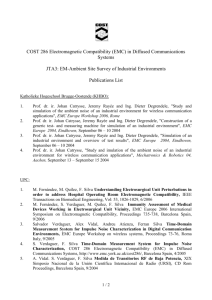Code of Conduct - Enloe Medical Center
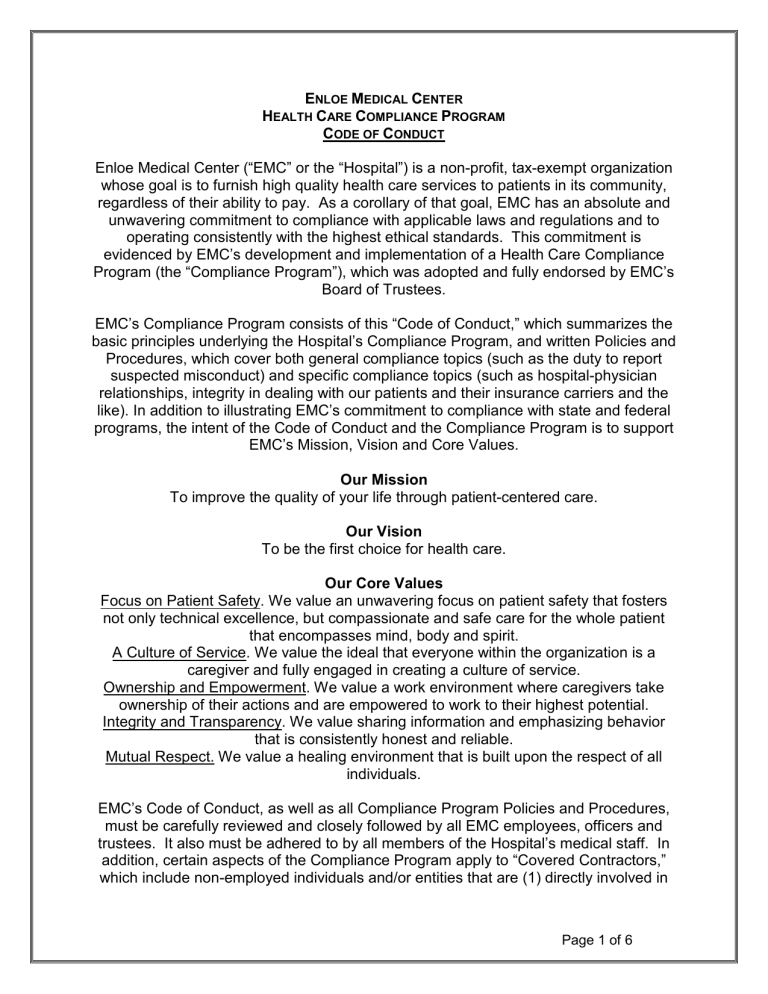
E NLOE M EDICAL C ENTER
H EALTH C ARE C OMPLIANCE P ROGRAM
C ODE OF C ONDUCT
Enloe Medical Center (“EMC” or the “Hospital”) is a non-profit, tax-exempt organization whose goal is to furnish high quality health care services to patients in its community, regardless of their ability to pay. As a corollary of that goal, EMC has an absolute and unwavering commitment to compliance with applicable laws and regulations and to operating consistently with the highest ethical standards. This commitment is evidenced by EMC’s development and implementation of a Health Care Compliance
Program (the “Compliance Program”), which was adopted and fully endorsed by EMC’s
Board of Trustees.
EMC’s Compliance Program consists of this “Code of Conduct,” which summarizes the basic principles underlying the Hospital’s Compliance Program, and written Policies and
Procedures, which cover both general compliance topics (such as the duty to report suspected misconduct) and specific compliance topics (such as hospital-physician relationships, integrity in dealing with our patients and their insurance carriers and the like). In addition to illustrating EMC’s commitment to compliance with state and federal programs, the intent of the Code of Conduct and the Compliance Program is to support
EMC’s Mission, Vision and Core Values.
Our Mission
To improve the quality of your life through patient-centered care.
Our Vision
To be the first choice for health care.
Our Core Values
Focus on Patient Safety. We value an unwavering focus on patient safety that fosters not only technical excellence, but compassionate and safe care for the whole patient that encompasses mind, body and spirit.
A Culture of Service. We value the ideal that everyone within the organization is a caregiver and fully engaged in creating a culture of service.
Ownership and Empowerment. We value a work environment where caregivers take ownership of their actions and are empowered to work to their highest potential.
Integrity and Transparency. We value sharing information and emphasizing behavior that is consistently honest and reliable.
Mutual Respect. We value a healing environment that is built upon the respect of all individuals.
EMC’s Code of Conduct, as well as all Compliance Program Policies and Procedures, must be carefully reviewed and closely followed by all EMC employees, officers and trustees. It also must be adhered to by all members of the Hospital’s medical staff. In addition, certain aspects of the Compliance Program apply to “Covered Contractors,” which include non-employed individuals and/or entities that are (1) directly involved in
Page 1 of 6
providing patient care (such as physicians and nurses), or (2) directly involved in submitting claims to any federal or state health care program.
Supplemental information relating to EMC’s Code of Conduct will be provided through periodic formal and informal training and education programs. Anyone who has a question concerning the Code of Conduct should seek guidance from EMC's Compliance Department.
Finally, each employee, officer, trustee, physician and Covered Contractor will be given a copy of the Code of Conduct, and sign a certification indicating that he/she/it has read, understands, and will comply with the Code of Conduct and EMC’s Compliance
Program Policies and Procedures.
Standard No. 1
Participation In Health Care Compliance Program
Participation in EMC's Compliance Program is a condition of employment and continued association with EMC.
The Compliance Program cannot be effective unless each and every employee, officer, trustee, physician and covered contractor actively participates in the Compliance
Program by, for example, carefully reviewing the Code of Conduct and attending EMC’s
Compliance Program training and education programs. It is critical that all employees, officers, trustees, physicians and Covered contractors participate in the Compliance
Program, as all aspects of the Hospital play an important role in achieving compliance.
Participation in EMC’s Compliance Program is a condition of employment and continued association with EMC, and will be a factor considered in each employee's performance evaluation. As such, an employee’s adherence to the Compliance Program will affect decisions relating to compensation, promotion and retention.
Standard No. 2
Compliance With Laws and Health Care Compliance Program
Compliance with applicable laws and regulations, as well as with the
Compliance Program, is a condition of employment by and continued association with EMC.
EMC operates in an industry that is among the most heavily regulated in the United
States — the health care industry. As such, EMC is subject to numerous federal and state civil and criminal laws and regulations, many of which focus on the accuracy of claims and other documents submitted to (or that support documents submitted to) federal and/or state health care programs. Violation of these laws and regulations can result in severe financial penalties for the Hospital and the individuals associated with the Hospital. Certain violations of state and/or federal laws also can result in imprisonment. Recognizing this environment, and the fact that lawful, ethical business practice is critically important to EMC, it is essential that all EMC employees, officers, trustees, physicians and Covered Contractors comply with the laws and regulations that are applicable to EMC’s business and with the Hospital’s Code of Conduct and
Compliance Program Policies and Procedures. Such compliance is a condition of
Leadership Manual Page 2 of 6
employment and continued association with the Hospital, and will be a factor considered in each employee’s performance evaluation.
Standard No. 3
Truth, Accuracy and Completeness
EMC employees, officers, trustees, physicians and Covered
Contractors must be timely, truthful, accurate and complete in all of their communications.
Consistent with EMC’s commitment to conduct its business ethically and with integrity, employees, officers, trustees, physicians and Covered Contractors must ensure that all oral or written statements, submissions to and other communications with federal and state regulators, other health care providers, payors, EMC patients, and others are timely, truthful, accurate and complete. Thus, for example, pre-operative notes must be completed accurately and completely before the relevant operation, and cannot be completed after the fact. It also is critical that all forms, certifications, statements and/or similar documents prepared by or at EMC, whether for internal or external review, be timely, truthful, accurate and complete. Ensuring that all communications meet these standards reinforces EMC’s unwavering commitment to ethical business practices.
Moreover, employees, officers, trustees, physicians and Covered Contractors must understand that the making of intentional false statements and the intentional submission of false claims are among the government’s greatest fraud and abuse concerns, and violations of the laws or regulations governing false statements and false claims are subject to severe penalties, including substantial fines and imprisonment.
Standard No. 4
Patient Care
EMC employees, physicians and Covered Contractors shall provide high quality health care services to all patients.
EMC treats all patients with respect and dignity and provides care that is appropriate, effective and of high quality. Accordingly, all employees, physicians and Covered
Contractors must treat all patients with compassion, sensitivity, respect and professionalism.
EMC makes no distinction in the admission, transfer or discharge of patients or in the care provided to patients based on race, color, religion, sex, sexual preference or gender identity, national origin, ability to pay, source of payment, or any other protected status in accordance with federal, state, and local law. Individual clinical care is based on identified patient health care needs, not on a patient’s economic or other status.
Leadership Manual Page 3 of 6
Standard No. 5
Confidentiality of Patient Information
EMC must protect the privacy and security of health-related information regarding patients.
As part of EMC’s business, it creates and receives health-related and other sensitive information about patients, their family members, and other individuals, such as information relating to a patient’s medical condition and status. EMC must respect and preserve the privacy and security of this personal health information, consistent with state and federal law (e.g., the Health Insurance Portability and Accountability Act of
1996, and relevant implementing regulations). Therefore, except to the extent permitted by law, EMC employees, officers, trustees, physicians and Covered Contractors shall not use or disclose personal health-related information about a patient to any third party ; nor shall they inappropriately access such information, including their own medical information or that of a family member or friend. Appropriate access shall be defined as for the purposes of treatment, payment or healthcare operations, or such other exception as may be provided by law.
Standard No. 6
Compliance Questions
If any person or entity associated with EMC has a question concerning whether a particular practice violates applicable laws or regulations or EMC's Compliance Program, he, she or it should seek guidance from his or her supervisor or EMC’s
Compliance Department.
Although one of the objectives of EMC's Compliance Program is to educate all EMC employees, officers, trustees, physicians and Covered Contractors about the basic requirements of applicable laws and regulations, EMC does not expect any of these persons to become legal experts. For precisely this reason, when an employee, officer, trustee, physician or Covered Contractor is not sure whether a particular activity or practice violates the law or any aspect of the Hospital’s Compliance Program, he, she or it should not
under any circumstances
"guess" as to the correct answer. Instead, he, she or it should seek appropriate guidance from his or her supervisor or EMC’s
Compliance Department. Simply put, when in doubt about the meaning or requirements of the law or EMC’s Compliance Program, ask. EMC employees, officers, trustees, physicians and Covered Contractors will not be penalized for asking compliance-related questions. To the contrary, EMC is dedicated to fostering a culture in which every person or entity associated with EMC is comfortable asking the questions necessary to ensure that he, she or it understands his, her or its obligations in full.
Leadership Manual Page 4 of 6
Standard No. 7
Duty to Report; Non-Retaliation
If an EMC employee, officer, trustee, physician or Covered
Contractor believes that an activity, practice or arrangement violates or may violate the law, regulations or EMC’s Compliance
Program, he, she or it must report this activity, practice or arrangement. This report may be made anonymously.
EMC will not take any adverse action against any person or entity who makes such a report in good faith and who was not involved in the practice or arrangement at issue.
The primary objective of EMC's Compliance Program is to prevent violations of applicable laws and regulations. No system or person, however, is perfect. Where such a violation may have occurred, EMC will conduct a prompt and thorough investigation of the suspected misconduct. This investigation will allow EMC to determine whether a violation has occurred and, if so, what corrective or remedial measures or disciplinary action, if any, to take. Accordingly, all employees, officers, trustees, physicians and Covered Contractors are required, as a condition of continued employment by or association with EMC, to report suspected misconduct. Reports of suspected misconduct may be made to a supervisor or EMC’s Compliance Department in writing or orally. EMC also has established a Compliance Hotline .
The number is 530-332-5519.
If a report is made in writing, the report need not include the identity of the person or entity making the report. In any event, EMC will strive to maintain the confidentiality of any reporting person or entity. It must be understood, however, that there may come a time when a reporting person’s or entity’s identity may become known or may have to be revealed (e.g., if government authorities become involved in the investigation).
Whether or not the identity of a reporting person or entity becomes known or is revealed, under no circumstances will EMC take adverse action against an EMC employee, officer, trustee, physician or Covered Contractor who, in good faith, reports actual or potential misconduct and who was not involved in the misconduct in question.
Standard No. 8
Corrective and Disciplinary Action
EMC will take corrective and/or disciplinary action against any person or entity who does not comply with the Compliance Program, or applicable laws and regulations.
EMC will take corrective and/or disciplinary action, ranging from additional training to a verbal warning to termination of employment, appointment or contract, against any employee, officer, trustee, physician or Covered Contractor, regardless of his, her or its level or position, who fails to comply with the Compliance Program or with applicable laws and regulations. The type of corrective action and/or severity of the disciplinary
Leadership Manual Page 5 of 6
3 action, which will be determined by members of senior management (in consultation with EMC’s Compliance Department and other relevant persons, as appropriate), will depend on a variety of factors, including (1) the nature and severity of the violation,
(2) whether the violation was committed intentionally, recklessly, negligently or accidentally, (3) whether the person or entity has committed any other violations in the past, (4) whether he, she or it self-reported the misconduct, and (5) whether (and the extent to which) he, she or it cooperated with EMC in connection with its investigation of the misconduct. Where appropriate, EMC also may take corrective and/or disciplinary action against supervisors who fail to detect or report misconduct on the part of employees under their supervision. In addition to taking corrective and/or disciplinary action, EMC will implement other remedial measures, as appropriate, in the event of a violation of the Compliance Program or of applicable laws and/or regulations.
Standard No. 9
Certification
All EMC employees, officers, trustees, physicians and Covered
Contractors must annually certify that they have read, understand, and will comply with the Compliance Program.
As part of the implementation of EMC’s Compliance Program, each EMC employee, officer, trustee, physician and Covered Contractor must certify that he, she or it has read, understands and will comply with this Code of Conduct and Compliance Program
Policies and Procedures. These certifications must be renewed on an annual basis. In addition, new employees, officers, trustees, physicians and Covered Contractors must execute identical certifications within thirty (30) days of commencing work for EMC.
History
Version No. Approved By Date Action Taken
(Revision, Retirement, etc.)
1 Board of Trustees 6/18/2007
2 Board of Trustees
(by adoption of
Mission, Vision and Core Values)
11/20/2009 Board approved Mission, Vision and
Core Values incorporated.
Board of Trustees 3/25/2013 Revision
Leadership Manual Page 6 of 6
EMC HEALTH CARE COMPLIANCE PROGRAM
CERTIFICATION
I hereby certify that I have been provided with a copy of EMC’s Code of Conduct, and that I have read, understand, and will comply with all components of the
Code of Conduct and EMC’s Health Care Compliance Program as a condition of my continued association with EMC.
Name (Printed)
Signature
Department (if applicable)
Employee ID # (if applicable)
Date
Version 3, 4/13
